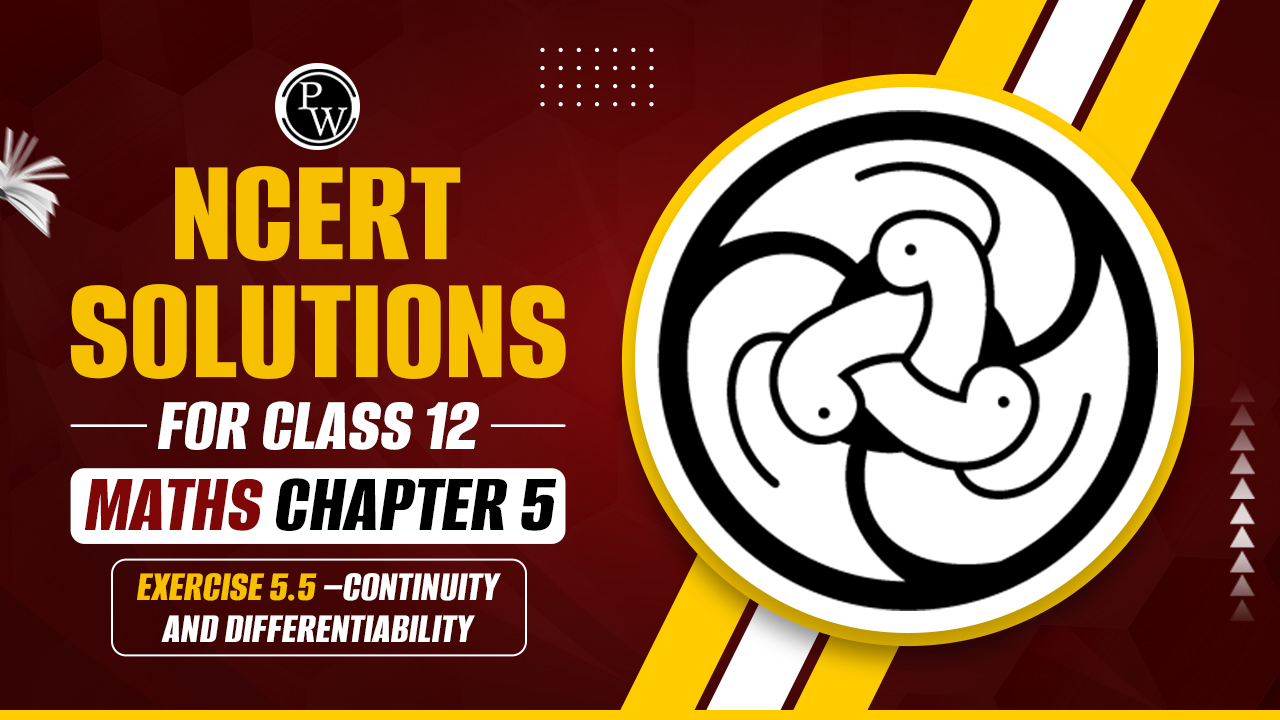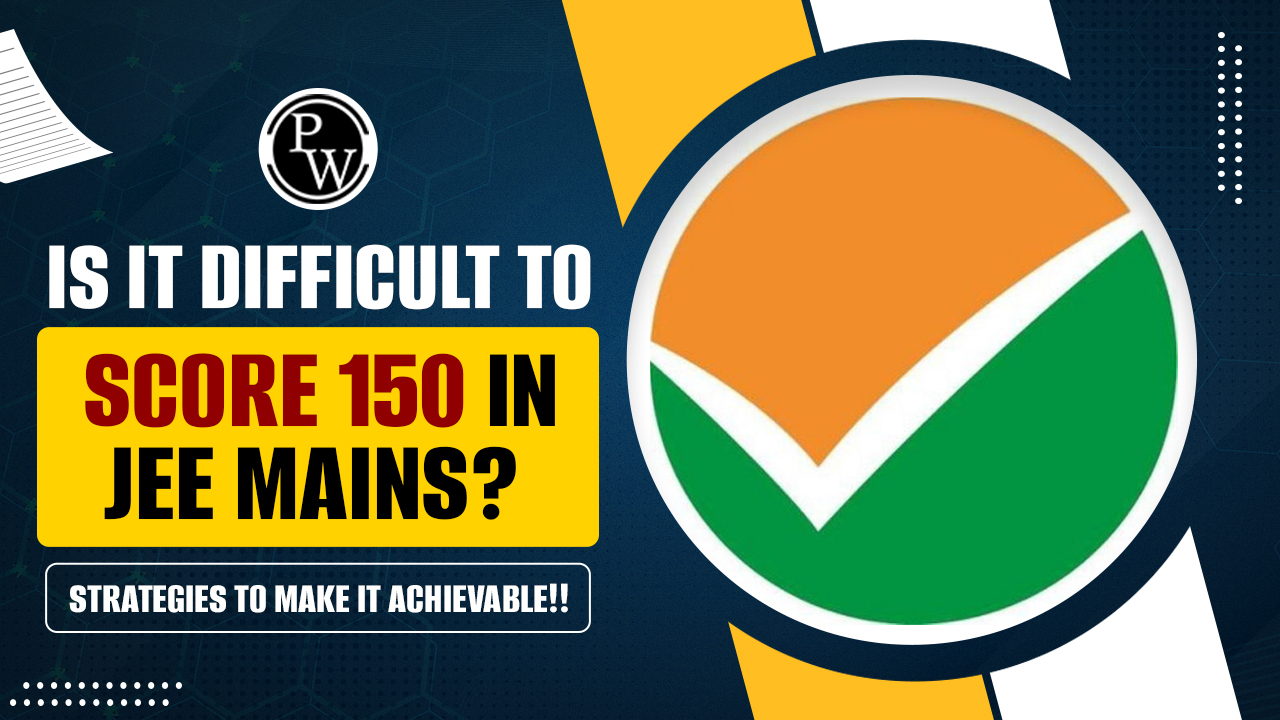NCERT Solutions For Class 12 Maths Chapter 5 Exercise 5.5 Continuity and Differentiability

Class 12 Maths Chapter 5 Exercise 5.5 Continuity and Differentiability:- In calculus, continuity and differentiability refer to the core of how functions behave and change. Continuity describes how smooth a function is at every point in the domain; it does not have breaks or jumps in its graph. If a function has a limit at a point that equates to its value, then that will be considered continuous.
On the other hand, differentiability extends the concept of continuity and includes the rate of change of the function. A function is itself described as differentiable at a point if it contains a derivative at that point—it means the tangent line, or equivalently, the rate of change at that particular point, is well-defined. Get NCERT Solutions For Class 12 Maths Chapter 5 Exercise 5.5 Continuity and Differentiability from the below article.
Check out: CBSE Class 12th Books
NCERT Solutions For Class 12 Maths Chapter 5 Exercise 5.5 Continuity and Differentiability
Here are NCERT Solutions For Class 12 Maths Chapter 5 Exercise 5.5 Continuity and Differentiability:-
Question 1. Differentiate the function with respect to x.
cos x.cos 2x.cos3x
Solution :
Let y = cos x.cos 2x.cos3x
Taking logarithm on both the sides, we obtain
Question 2. Differentiate the function with respect to x.
Solution :
Let y =
Taking logarithm on both the sides, we obtain
Question 3. Differentiate the function with respect to x.
Solution :
Let, y =
Taking logarithm on both the sides, we obtain
log y = cos x .log(log x)
Differentiating both sides with respect to x, we obtain
Question 4. Differentiate the function with respect to x.
Solution :
Question 5. Differentiate the function with respect to x.
Solution :
Check out: Class 12th Sample Papers
Question 6. Differentiate the function with respect to x.
Solution :
Differentiating both sides with respect to x, we obtain
Differentiating both sides with respect to x, we obtain
Question 7. Differentiate the function with respect to x.
Solution :
Differentiating both sides with respect to x, we obtain
Differentiating both sides with respect to x, we obtain
Question 8. Differentiate the function with respect to x.
Solution :
Differentiating both sides with respect to x, we obtain
Question 9. Differentiate the function with respect to x.
Solution :
Let, y =
Differentiating both sides with respect to x, we obtain
Differentiating both sides with respect to x, we obtain
Question 10. Differentiate the function with respect to x.
Solution :
Let, y =
Differentiating both sides with respect to x, we obtain
Differentiating both sides with respect to x, we obtain
Question 11. Differentiate the function with respect to x.
Solution :
Let, y =
Differentiating both sides with respect to x, we obtain
Differentiating both sides with respect to x, we obtain
Check out: Class 12 Maths Sample Question Papers
Question 12. Find dy/dx of function.
xy+ yx = 1
Solution :
The given function is xy + yx = 1
Let xy = u and yx = v
Then, the function becomes u + v = 1
∴du/dx + dv/dx = 1
Differentiating both sides with respect to x, we obtain
Differentiating both sides with respect to x, we obtain
Question 13. Find dy/dx of function.
yx = xy
Solution :
The given function is yx = xy
Taking logarithm on both the sides, we obtain
x log y = y log x
Differentiating both sides with respect to x, we obtain
Question 14. Find dy/dx of function.
(cos x)y = (cos y)x
Solution :
The given function is (cos x)y = (cos y)x
Taking logarithm on both the sides, we obtain
y log cos x = x log cos y
Differentiating both sides, we obtain
Question 15. Find dy/dx of function.
xy = e(x-y)
Solution :
The given function is xy = e(x-y)
Taking logarithm on both the sides, we obtain
log(xy) = log(e(x-y))
Differentiating both sides with respect to x, we obtain
Question 16. Find the derivative of the function given by and hence find f'(1)
Solution :
The given relationship is
Taking logarithm on both the sides, we obtain
Differentiating both sides with respect to x, we obtain
Question 17. Differentiate in three ways mentioned below
(i) By using product rule.
(ii) By expanding the product to obtain a single polynomial.
(iii By logarithmic differentiation.
Do they all give the same answer?
Solution :
Let, y =
(i)
(ii)
(iii) y =
Taking logarithm on both the sides, we obtain
Differentiating both sides with respect to x, we obtain
From the above three observations, it can be concluded that all the results of dy/dx are same.
Question 18. If u, v and w are functions of x, then show that
in two ways-first by repeated application of product rule, second by logarithmic differentiation.
Solution :
Let y = u.v.w = u(v.w)
By applying product rule, we obtain
By taking logarithm on both sides of the equation y = u.v.w, we obtain
log y = log u + log v + log w
Differentiating both sides with respect to x, we obtain
Check out: Class 12th Question Banks
Class 12 Maths Chapter 5 Exercise 5.5 Continuity and Differentiability Summary
Continuity of a function f(x) at a point 'a' in its domain:
-
A function is considered continuous at 'a' if three conditions hold:
-
f(a) exists (i.e., the function has a finite output at 'a').
-
The limit of f(x) as x approaches 'a' exists (i.e., the function approaches a specific value as x gets arbitrarily close to 'a' from either side).
-
The two limits are equal. In other words, lim f(x) = f(a).
Differentiability of a function f(x) at a point 'a' in its domain:
-
A function is differentiable at 'a' only if it's also continuous at 'a'.
-
The additional (shart) or condition for differentiability is that the limit of the difference quotient exists as x approaches 'a'. The difference quotient is: lim [f(x) - f(a)] / (x - a)
-
If this limit exists, it represents the derivative of the function at 'a' and is denoted by f'(a).
Check out: Class 12 Mathematics Question & Concept Bank
Class 12 Maths Chapter 5 Exercise 5.5 Continuity and Differentiability FAQs
Q1. What is continuity of a function?
Ans. Continuity refers to the absence of breaks, jumps, or holes in the graph of a function. Formally, a function f(x)f(x)f(x) is continuous at a point x=ax = ax=a if limx→af(x)=f(a)\lim_{x \to a} f(x) = f(a)limx→af(x)=f(a).
Q2. How do you determine if a function is continuous over an interval?
Ans. Check if the function is continuous at each point within the interval and if the limits from both sides approach the same value at the endpoints of the interval.
Q3. What does it mean for a function to be differentiable at a point?
Ans. A function f(x)f(x)f(x) is differentiable at a point x=ax = ax=a if its derivative f′(a)f'(a)f′(a) exists. Geometrically, this means the function has a well-defined tangent line at x=ax = ax=a.
Q4. What is Rolle's Theorem?
Ans. Rolle's Theorem states that if a function f(x)f(x)f(x) is continuous on the closed interval [a,b][a, b][a,b], differentiable on the open interval (a,b)(a, b)(a,b), and f(a)=f(b)f(a) = f(b)f(a)=f(b), then there exists at least one point ccc in (a,b)(a, b)(a,b) where f′(c)=0f'(c) = 0f′(c)=0.
Q5. What is the Mean Value Theorem?
Ans. The Mean Value Theorem states that if a function f(x)f(x)f(x) is continuous on the closed interval [a,b][a, b][a,b] and differentiable on the open interval (a,b)(a, b)(a,b), then there exists at least one point ccc in (a,b)(a, b)(a,b) where f′(c)=f(b)−f(a)b−af'(c) = \frac{f(b) - f(a)}{b - a}f′(c)=b−af(b)−f(a).









